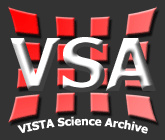 |
 |
| IFA ROE |
|
Home |
Overview |
Browser |
Access |
Login |
Cookbook |
|
Working with VIRCam flat files from the CASU pipeline
Also see the technical page at CASU and this CASU page about catalogues.The VSA archives the FITS images and catalogues produced by the CASU pipeline. Metadata from the images and objects from the catalogues are processed and ingested into database tables (also see data overview)
Typically the FITS images have a .fit file extension while the catalogues end _cat.fits. The database entity MULTIFRAME references a FITS image and if applicable a corresponding FITS catlogue. Note only stacked images have catalogues (eg calibration frames and intermediate science frames do not have catalogues.)
Apart from secondary data products (e.g. mosaic images) CASU FITS files have a primary header and FITS extensions with each extension representing one of the detectors. The FITS image files are RICE compressed and some applications will require the file to be uncompressed before use, see notes on compression.
Starlinks's GAIA is able to open the FITS images directly for display.
Converting catalogue fluxes to magnitudes
The FITS catalogues contain un-calibrated fluxes. When ingested in to the database tables (DETECTION and SOURCE tables) objects will have their fluxes converted to calibrated magnitudes. The fluxes contained in the FITS catalogues can be converted to calibrated magnitudes using attributes in the FITS header of the relevant extension. Whereby, the instrumental magnitude, instMag, is
instMag = -2.5 * log10(flux) and
the extinction correction, extCorr, is
extCorr = -extinct * (airmassStart + airmassEnd)/2) -1) and
the exposure correction, texpCorr, is
texpCorr = 2.5 * log10(exptime)
then the calibrated magnitude, calMag, is
calMag = instMag + magZpt + extCorr + texpCorr - aperCor
In addition to the corrections shown here, further corrections can be made to account for illumination.
The values for extinct, airmassStart, airmassEnd, exptime and magZpt can be found in the FITS header of the relevant extension under keywords: EXTINCT, AMSTART, AMEND, EXP_TIME and MAGZPT. The values for flux are read for each object (row) in the catalogue from the required flux attribute eg Aper_flux_3 or Kron_flux. For aperture corrected magnitudes use the corresponding APERCOR value in the FITS extension header eg APCOR3.
By way of an example, the 1st extension of a FITS catlogues has the following header information
AMSTART = 1.083 / Airmass at start of observation AMEND = 1.084 / Airmass at end of observation EXP_TIME= 20.000000 / [s] Integration time per exposure APCOR1 = 1.242335 / Stellar aperture correction - 1/2x core flux APCOR2 = 0.8231881 / Stellar aperture correction - core/sqrt(2) flux APCOR3 = 0.4040413 / Stellar aperture correction - core flux APCOR4 = 0.1864481 / Stellar aperture correction - sqrt(2)x core flu APCOR5 = 0.07809448 / Stellar aperture correction - 2x core flux APCOR6 = 0.02818298 / Stellar aperture correction - 2sqrt(2)x core fl APCOR7 = 0. / Stellar aperture correction - 4x core flux MAGZPT = 22.771 / Photometric ZP (mags) for default extinction EXTINCT = 0.05 / Extinction coefficient (mags)
So say for a given object the aper_flux_3 is 0.60321E+03 and the kron_flux is 0.10143E+04. Then
extCorr = -0.00418, texpCorr=3.25257 and
aperMag3 =-2.5*log10(0.60321E+03)+22.771-0.00418+3.25257-APERCOR3 = 18.664 and
kronMag =-2.5*log10(0.10143+04)+22.771-0.00418+3.25257 = 18.504
Home | Overview | Browser | Access | Login | Cookbook
Listing | FreeSQL
Links | Credits
WFAU, Institute for Astronomy, vsa-support@roe.ac.uk
Royal Observatory, Blackford Hill
Edinburgh, EH9 3HJ, UK
3/3/2022